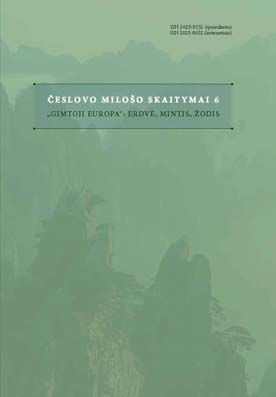«Это я или культура, в которой я вырос?»: чеслав милош об аутентичности поэта в культуре
“Is It Me or Culture in Which I Grew Up?”: Czesław Miłosz on the Problem of Poet’s Authenticity in Culture
Author(s): Elena BrazgovskayaSubject(s): Literary Texts
Published by: Vytauto Didžiojo Universitetas
Keywords: Self-identity; authenticity; the style of self-expression; the conventions of language and culture; Czesław Miłosz
Summary/Abstract: The article analyzes Czestlaw Miłosz’s position on the issue of the authenticity of poet in culture. To what extent is it possible to “be oneself”, if the poet is included in the global discourse – the language and culture. There is no other concept, which presents so many definitional problems as the “self”. The essence of “I” is a self-reference. The personal is covered up by the linguistic (narrative) structure. What stylistic strategies does Miłosz’s authenticity (identity) reveal? He labeled them as the “distance” between reality and creator, and “sterility” of speech. Miłosz’ textual identity, aimed at preserving his authenticity in culture, is also constructed in the acts of auto-translation, comments to his own texts, translations, and auto-translations. Within the framework of general systems theory this issue is considered as the dual ontology of any object: the reverse side of the autonomy of any object means functioning as an element of a certain system. At each moment of life, a person, defining the boundaries of one’s “discrete self,” inevitably becomes aware of oneself as a structural part of the global system without fixed borders. For Miłosz to be oneself, to be an individual means to go beyond the conventions of language and culture. But the poet can not undo the fact that language and space of texts (literature) is the house of a poet. Miłosz talks about the illusion of an absolute correspondence between signifier and signified: between the self, who writes, and I, who becomes the target of language representation.
Journal: Česlovo Milošo skaitymai
- Issue Year: 2013
- Issue No: 6
- Page Range: 106-116
- Page Count: 11
- Language: Russian

